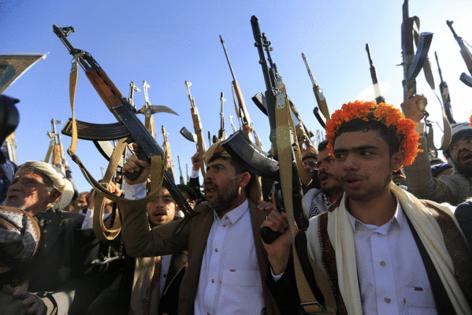Israel hits back at Houthis in Yemen after their slow escalation
Published in News & Features
Israel struck multiple targets in Yemen it said were controlled by Houthis, the last of the Iran-backed groups still fully engaged in the regional war that began 14 months ago.
Targets hit Thursday included military infrastructure at the Sanaa International Airport and in the Hezyaz and Ras Kanatib power stations, according to the Israel Defense Forces. They also struck military infrastructure in the Hodeidah, Salif and Ras Kanatib ports on the western coast. At least three deaths were reported so far, according to the Houthi-operated Al-Masirah TV.
“We are determined to cut off this terrorist arm of Iran’s evil axis,” Israeli Prime Minister Benjamin Netanyahu said. “We will persist in this until we complete the task.”
It was a rebuff to efforts by the Houthis to slowly escalate their attack on Israel with an eye toward avoiding full-out retaliation. Israelis viewed the nature of the attacks — mostly in the early hours of the night over the past week — as evidence that the rebel group was trying to inflict fatigue while keeping a cap on the confrontation.
With Hamas on the ropes after losing much of its forces in Gaza since it began the conflict in October 2023 and Hezbollah in an official truce, Houthis are the only ones shelling Israel, although from some 2,000 kilometers (1,200 miles) away.
“We are witnessing escalation management by the Houthis,” said Uzi Rubin, an architect of Israel’s air defenses and veteran Defense Ministry adviser. “They vowed to attack Tel Aviv because we attacked Sanaa, but they are not yet ready to inflict major civilian casualties. Pre-dawn strikes mean people aren’t out and about.”
In response to earlier attacks, Israel twice bombed the Hodeidah port, a key source of income and a conduit for imported goods for Houthis. It has also threatened to attack Houthi leaders. The U.S. and U.K. have also attacked the militia.
The equilibrium the Houthis sought proved difficult to maintain. Of four “Palestine-2” ballistic missiles launched at Tel Aviv over the last week, Israel said it shot down three, but one exploded in a vacant playground, shattering the windows of homes and injuring three people.
Sirens sounding
Perhaps more disruptive for Israelis, hundreds of thousands of people rush to shelters each time sirens sound throughout Israel’s main population center. That’s a precaution not just against direct impacts but also the shower of debris from high-altitude interceptions. A school building hit in one overnight attack was demolished when part of a Houthi missile warhead landed on it.
In statements on the launches, Houthis have pledged to keep battling Israel until an end to the war in Gaza, which began last year following surprise raids by Hamas into southern Israel. Houthis, like other Tehran-backed groups Hamas and Hezbollah, are designated as terrorists by the U.S.
They have attacked countless ships in the Red Sea and Israel’s port of Eilat in solidarity with Hamas over the past 14 months. In recent strikes, Houthis claimed to be aiming for military installations in Tel Aviv — a relatively new target for the group.
The responses of ordinary Israelis have ranged from jittery to jocular. A TV show interviewed experts about the dangers of sleep deprivation. In parliament, a lawmaker reassured her son by phone that she would be there to hug him in the middle of the night, a conversation caught by the podium microphone. A popular social-media meme flayed the Houthis for disrupting couples’ intimacy.
“We have long seen that our enemies use our own alert system as a form of psychological pressure against us. Here that works on a large scale,” Rubin, the military adviser, said.
Doron Hadar, a former commander of the Israeli military’s Crisis Management Unit, which runs simulations of enemy capabilities and doctrines, also saw a bid to chafe nerves.
“They’re trying to drive us nuts, while keeping below a certain threshold in this conflict,” said Hadar, who now heads Critical Impact, a private consultancy. “Iran isn’t in a rush to put its Yemeni branch’s head on the block quite yet.”
--------
With assistance from Kateryna Kadabashy, Sherif Tarek and Mohammed Hatem.
©2024 Bloomberg L.P. Visit bloomberg.com. Distributed by Tribune Content Agency, LLC.







Comments